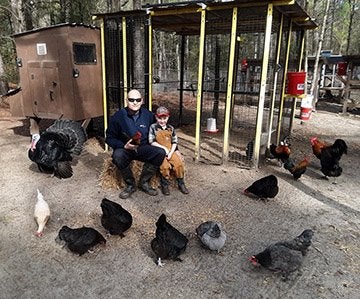What was once a staple of rural life has made a comeback and has become popular in the suburbs. More and more people are raising flocks of chickens in their backyards.
I have memories of visiting the old family homestead in Alabama when I was a child. My Great-Aunt Mattie Ruth would go out into the back yard, grab one of the roosters, snap its neck with one flick of her wrist and then hand me the dead bird. Most kids today would be traumatized watching such a thing.
“Here boy,” Mattie Ruth would cackle. “Now get them feathers plucked so we can have him for supper.”
[adrotate banner=”34″]
These days, though, people don’t raise chickens as much for meat, but for the daily supply of eggs they provide. David Young, who is an administrator on the “Hobby Farmers of The CSRA” Facebook page says that most hobby gardeners keep chickens for not only eggs but for their poop as well.
“I don’t know who coined the phrase,” he says, “but chickens are pets that give you breakfast everyday, and their manure is great for the garden.”
For Jenny Hendricks, adding chickens to her yard was a way to be more self-sufficient and to try to live more off the land than the grocery store.
“I started small, but now I have 30 chickens and a rooster named Fabio,” she says. “Fabio likes to chase my husband around the yard. It’s hysterical!”
If you think 30 chickens is a lot, Jason Irby, who is an auto mechanic by trade, says he took his then 4-year-old son Mason to the annual “Chicken Swap” at Barnhart’s Feed and Seed just for a fun family outing. The boy begged to be able to take a chicken home. What started out as having just a couple of birds grew into a flock of more than 50.
For Irby, it became a fun hobby for him and his son.
“They call it chicken math,” Irby laughs. “When you get one breed, you want to get more and more and after a while the math really adds up! You end up with a yard full of birds!”
Keeping chickens is legal without a permit throughout the CSRA with the exception of the city limits of Grovetown. Hens do not need a rooster among the flock to produce eggs, and the average hen will produce 1 egg a day. A coop can be constructed for less than $100 in materials, and David Young says it is important to build a strong and secure coop.
“The chickens need a place to roost and feel safe,” he says, adding, “Possums and raccoons come out at night, and you need to keep them from getting into the coop and stealing eggs or harming the hens.”
One warning, though, if you prize a well-manicured backyard: chickens are not for you. They spend their entire day pecking the soil looking for worms and grubs. I can tell you from experience that before long your once pristine lawn will be, well, hen pecked.
Scott Hudson is the Managing Editor of The Augusta Press. Reach him at scott@theaugustapress.com
[adrotate banner=”23″]










